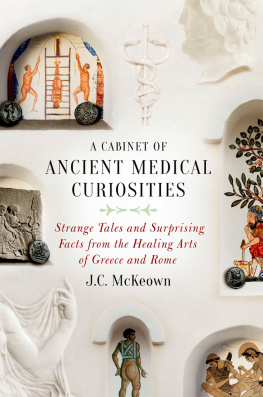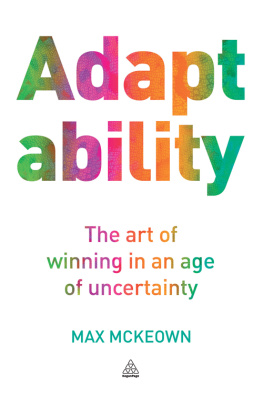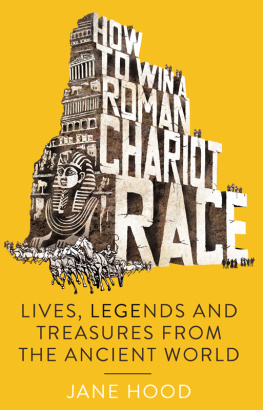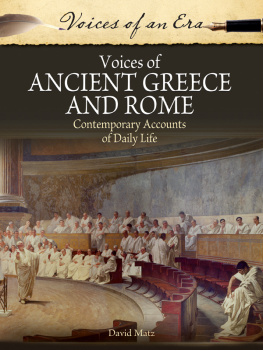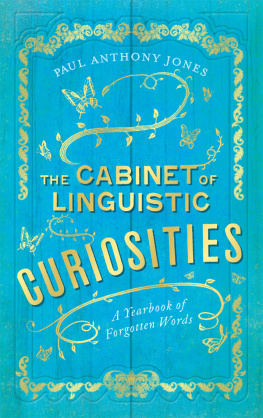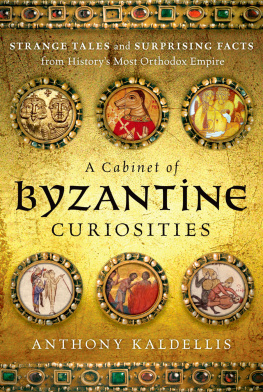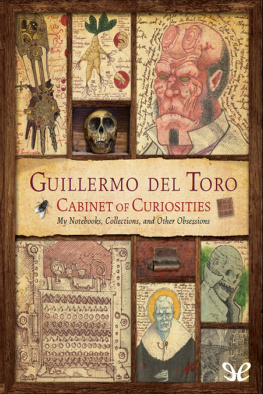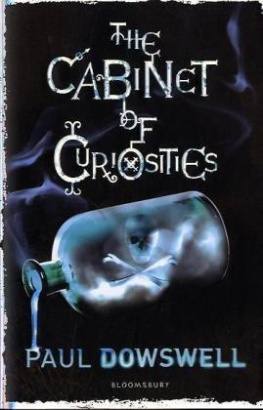Mckeown - A Cabinet of Ancient Medical Curiosities: Strange Tales and Surprising Facts from The Healing Arts of Greece and Rome
Here you can read online Mckeown - A Cabinet of Ancient Medical Curiosities: Strange Tales and Surprising Facts from The Healing Arts of Greece and Rome full text of the book (entire story) in english for free. Download pdf and epub, get meaning, cover and reviews about this ebook. City: Oxford, year: 2017;2015, publisher: Oxford University Press, genre: Religion. Description of the work, (preface) as well as reviews are available. Best literature library LitArk.com created for fans of good reading and offers a wide selection of genres:
Romance novel
Science fiction
Adventure
Detective
Science
History
Home and family
Prose
Art
Politics
Computer
Non-fiction
Religion
Business
Children
Humor
Choose a favorite category and find really read worthwhile books. Enjoy immersion in the world of imagination, feel the emotions of the characters or learn something new for yourself, make an fascinating discovery.
A Cabinet of Ancient Medical Curiosities: Strange Tales and Surprising Facts from The Healing Arts of Greece and Rome: summary, description and annotation
We offer to read an annotation, description, summary or preface (depends on what the author of the book "A Cabinet of Ancient Medical Curiosities: Strange Tales and Surprising Facts from The Healing Arts of Greece and Rome" wrote himself). If you haven't found the necessary information about the book — write in the comments, we will try to find it.
A Cabinet of Ancient Medical Curiosities: Strange Tales and Surprising Facts from The Healing Arts of Greece and Rome — read online for free the complete book (whole text) full work
Below is the text of the book, divided by pages. System saving the place of the last page read, allows you to conveniently read the book "A Cabinet of Ancient Medical Curiosities: Strange Tales and Surprising Facts from The Healing Arts of Greece and Rome" online for free, without having to search again every time where you left off. Put a bookmark, and you can go to the page where you finished reading at any time.
Font size:
Interval:
Bookmark:

 OF
OF 
ANCIENT MEDICAL CURIOSITIES

Oxford University Press is a department of the University of Oxford. It furthers the Universitys objective of excellence in research, scholarship, and education by publishing worldwide. Oxford is a registered trade mark of Oxford University
Press in the UK and certain other countries.
Published in the United States of America by Oxford University Press
198 Madison Avenue, New York, NY 10016, United States of America.
Oxford University Press 2017
All rights reserved. No part of this publication may be reproduced, stored in a retrieval system, or transmitted, in any form or by any means, without the prior permission in writing of Oxford University Press, or as expressly permitted by law, by license, or under terms agreed with the appropriate reproduction rights organization. Inquiries concerning reproduction outside the scope of the above should be sent to the Rights Department, Oxford University Press, at the address above.
You must not circulate this work in any other form and you must impose this same condition on any acquirer.
Library of Congress Cataloging-in-Publication Data
Names: McKeown, J. C.
Title: A cabinet of ancient medical curiosities : strange tales and surprising facts from the healing arts of Greece and Rome / J.C. McKeown.
Description: Oxford ; New York, NY : Oxford University Press, [2017] |
Includes bibliographical references.
Identifiers: LCCN 2016010809 (hardback) | LCCN 2016012218 (ebook) | ISBN 9780190610432 | ISBN 9780190610449 (ebook) | eISBN 9780190610456
Subjects: LCSH: Medicine, Greek and Roman. | Medicine, Ancient.
Classification: LCC R138 .M394 2017 (print) | LCC R138 (ebook) | DDC 610.938dc23
LC record available at https://lccn.loc.gov/2016010809
In gratitude to the doctors and nurses who saved my life one summers day
THE HIPPOCRATIC treatise On the Nature of Man begins by declaring, Anyone who is accustomed to listening to discussions of the nature of man in a broader context, and not just in its relation specifically to medicine, will find nothing to interest him in this work of mine. By contrast, the main emphasis in this book is on the wider aspects of life in antiquity as preserved for us in the medical texts, rather than on medicine itself. Here you may expect to find vignettes of doctors wrangling at the sickbed and impressing large audiences with their surgical skills; cures for migraine such as wrapping an electric fish or a womans brassiere or a bandage containing mouse droppings round the patients head (headaches, and also baldness, can be prevented by having ones hair cut on the seventeenth or the twenty-ninth day after the new moon); donkeys in the sickroom to ensure a fresh supply of milk; a great profusion of amulets, such as a strangled viper to ward off tonsillitis or a cuckoo in a hareskin pouch to induce sleep; and famous old jokes on the order of A man went to a doctor and said, Doctor, I feel dizzy for half an hour when I wake up, and then I feel fine. To which the doctor replied, Well then, wake up half an hour later!
There is no way to mitigate the absurdity of countless assertions about medicine made in antiquity. To take just a few random examples, we can only wonder at such statements as:
Medicinesbecome useless if they happen to be placed on a table before they are administered.
Pubertycan be retarded by smearing bats blood on young girls breasts and young boys testicles.
One of Pythagorass soundest observations was the discovery that a child given a name with an odd number of vowels is likely to suffer lameness, loss of eyesight, and other such defects on the right side of the body, but on the left side if the number of vowels is even.
It may be that there are some medical practitioners nowadays who, if they think about the origins of their profession at all, are glibly dismissive of just about every achievement in the field before the discovery of microorganisms and the technology to study them. Such a complacent attitude, which takes no account of the many brilliant insights into medicine that we owe to antiquity, would be misguided, but this book will do little or nothing to correct it. As will already be obvious from the quotations above, my chief aspiration is to provide glimpses into the world of medicine in the distant past that offer entertainment rather than enlightenment. I do not have the competence to speak with authority on any medical topic, ancient or modern, and my modus operandi unabashedly makes no attempt to give a fair and balanced account of Greek and Roman medicine. The focus is primarily on the odd, the bizarre, and the downright weird, such as prognosis through astrology and the wandering womb (see pp. 17 and 95); few of the texts quoted will even hint at the more rational and scientific aspects of ancient medical thought.
Medicine has developed in such radically different ways since antiquity that the content of this book will often seem rather surprising to a reader more accustomed to the modern medical world. Great prominence is given, for example, to medicines supposed links with religion and with magic, to quaint procedures such as bloodletting, and to outdated theories such as the extremely tenacious belief in the four humors. On the other hand, voluminous as they are, the ancient sources are conspicuously reticent about aspects of the discipline that are of central significance in modern medicine. Since families were expected to take care of their own infirm and elderly, we hear little about care for the physically disabled and there was no specialization in geriatrics; dentistry involved hardly more than the extraction of teeth (though some people had dentures or gold teeth); addiction, whether to alcohol or to other drugs, is rarely mentioned; sexually transmitted infections seem not to have been as rife or as virulent as nowadays; surgery was widely practiced but, given the ignorance of internal anatomy and the absence of effective anesthetics, it was a dreaded and desperate remedy, and therefore most accounts of such procedures are inevitably brief and superficial.
The advances being made in modern medical science are unprecedented in both their range and their rapidity. Since the turn of the millennium, the human genome has been mapped, minimally invasive and robotic surgery has become commonplace, and the first human kidney and liver have been grown. Expectations are high for decisive breakthroughs in the treatment of cancer, genetic disorders, and cardiac and neurological diseases. These lists could easily be extended. Medical research is looking to the future with the realistic presumption of ever more awesome progress.
It has not always been so. Until relatively recent times, medicine, like most sciences, was firmly focused on the revered past rather than on the unknown future. In antiquity, the physician par excellence was Hippocrates of Cos (fifth/fourth cent. B.C.); because of his great reputation, the seventy or so treatises in the Hippocratic corpus were attributed to him, even though he is not demonstrably the author of any of them and many were probably written after the great mans death. Galen (second/third cent. A.D.) dominated Western medical thought virtually unchallenged till the Renaissance, and some of his teachings were still the accepted dogma well into the nineteenth century. That he remained authoritative for more than one and a half millennia indicates conservatism of a very extreme order. In fact, such commitment to intellectual inertia can be seen to extend over an even longer period, given that Galens writings were themselves so heavily influenced by the Hippocratic corpus.
Font size:
Interval:
Bookmark:
Similar books «A Cabinet of Ancient Medical Curiosities: Strange Tales and Surprising Facts from The Healing Arts of Greece and Rome»
Look at similar books to A Cabinet of Ancient Medical Curiosities: Strange Tales and Surprising Facts from The Healing Arts of Greece and Rome. We have selected literature similar in name and meaning in the hope of providing readers with more options to find new, interesting, not yet read works.
Discussion, reviews of the book A Cabinet of Ancient Medical Curiosities: Strange Tales and Surprising Facts from The Healing Arts of Greece and Rome and just readers' own opinions. Leave your comments, write what you think about the work, its meaning or the main characters. Specify what exactly you liked and what you didn't like, and why you think so.

